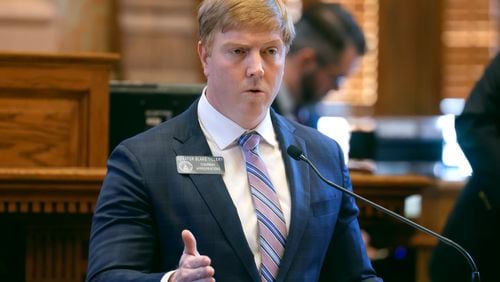Georgia Senate budget writers Tuesday passed a spending plan for the upcoming year that would give troopers, GBI investigators and game wardens $6,000 raises while teachers and other state employees would receive a $2,000 salary boost.
The budget for fiscal 2024 passed by the Senate Appropriations Committee now heads to the chamber for its consideration Thursday. Lawmakers need to finalize a spending plan before they end their session next week, and a full Senate vote will set up negotiations between the chambers.
Senate leaders had extra money to spend after cutting about $105 million from Gov. Brian Kemp’s proposal for University System of Georgia spending. That is essentially the same amount Kemp and lawmakers recently approved for a new electronic medical records system for the Medical College of Georgia, part of Augusta University.
Wellstar Health System is negotiating a partnership with AU Health System and could possibly take it over. Senate leaders have raised questions about the cost of the medical records system. Wellstar has also been a vocal critic of the Senate’s push to make it easier for new hospitals to be built in Georgia.
Sonny Perdue, the University System’s chancellor and a former governor, said Wednesday that he’s not panicking over the move by Senate leaders to cut the system’s budget.
”It’s not over ‘til it’s over, that’s the one thing about the legislative session,” Perdue said. “I think the fact is these are signals that go back and forth between the House and the Senate throughout the legislative session. We feel confident that these things will resolve themselves by the end of the session.”
Among the funding cut by the Senate was money for Georgia Public Broadcasting, which would see its budget reduced 26%. Some of the money the House put in for school nutrition, sexual assault nurse examiners and mental health was cut as well by the Senate.
The Senate proposal increases the pay raise for some law enforcement staffers — such as troopers — from the $2,000 Kemp proposed and $4,000 the House proposed to $6,000. Senate Appropriations Chairman Blake Tillery, R-Vidalia, said the raises are aimed at retaining law enforcement, and it was funded by reducing the money budgeted to train new troopers.
“We weren’t trying to single anyone out and make them more important than the others, but we were trying to recognize the hard work and the increased duties we have placed on these individuals over the past two years,” Tillery said. “We believe keeping our experienced law enforcement matters, and there is a learning curve when we bring new troopers on.”
The fiscal 2024 budget that Senate writers passed included $1.25 million to open a Georgia State Patrol satellite post in Buckhead that would house up to 20 troopers from the motor unit and Nighthawks DUI Task Force.
The House proposed the expenditure on the heels of a two-year effort by disgruntled residents in the wealthy north Atlanta neighborhood to secede from the city. Secession supporters cited frustration with Atlanta’s response to high rates of violent crime. Their effort was voted down earlier in the session in the Senate.
Under the budget, the state would spend a record $13 billion on K-12 schools next year.
The Senate agreed with Kemp’s proposal to fund public school HOPE college scholarship awards at 100% of tuition. Currently they are closer to 90% except for high-achieving students who earn Zell Miller scholarships.
The Senate, like the House, added $26.7 million to the budget to give 54,000 state government pensioners a $500 boost next year. The House and Senate did the same in this year’s budget.
State government pensioners got their first cost-of-living increase in more than a decade last year and have long complained about the lack of raises. Retired teachers and University System employees in the Teachers Retirement System pension program get 3% annual cost-of-living increases.
The Senate added $173 million to the state’s reinsurance program, which is designed to stabilize the health insurance market and make coverage more affordable. That’s almost twice as much as Kemp proposed to spend in January.
The spending plan would borrow more than $600 million for new construction projects, including about $50 million for a research tower at Georgia State University in Atlanta, $30 million for the second phase of a modernization project at the University of Georgia and $27.5 million for a science, technology, engineering and math education building at Kennesaw State University.
Staff writer Vanessa McCray contributed to this article.








